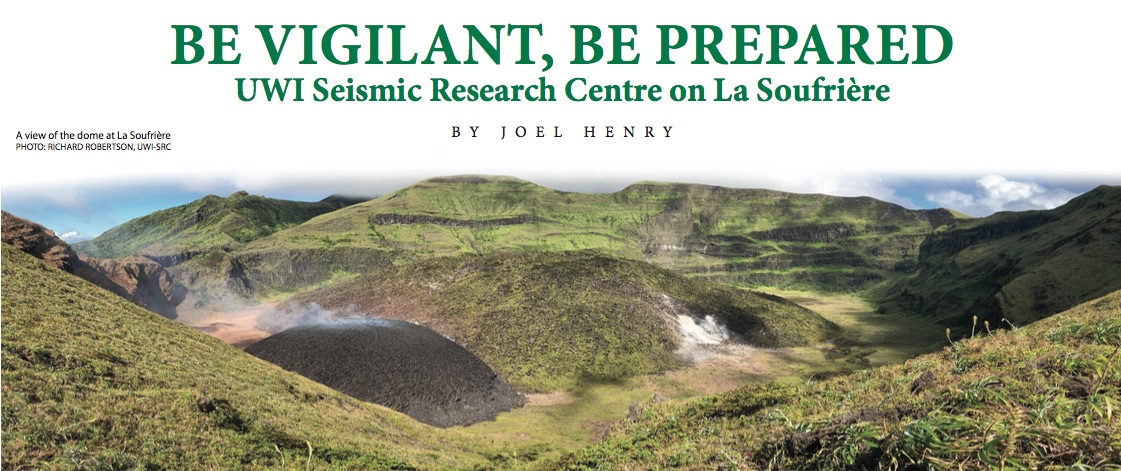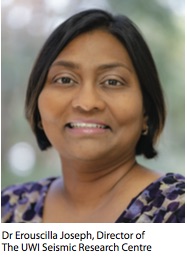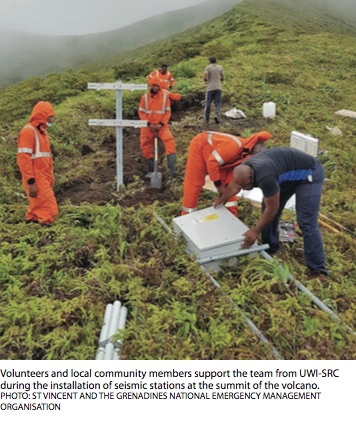
Listen to official sources, familiarise yourself with emergency protocols, and be prepared – if necessary – to evacuate.

These are the recommendations from The University of the West Indies Seismic Research Centre (UWI-SRC) to the people of St Vincent living with the potential risks from the ongoing eruption of La Soufrière volcano.
UWI-SRC, the official source for information on earthquakes and volcanoes in the English-speaking Caribbean, says that although the current eruption at La Soufrière is, at the moment, localised close to the crater itself, the volcano does have the potential for more powerful activity, and residents in the hazard areas should be vigilant.
Dr Erouscilla Joseph, Director of the Centre, said that the eruption at present was effusive, not explosive, however that could change given the historical activity observed at La Soufrière.
“Magma is gently oozing out through a vent and forming a dome,” said Dr Joseph. “The possibility of this type of eruption going from effusive to explosive does exist. This volcano can show both types of eruptions. At this time, based on the information we have, the definitive timeline of this happening, or if it will happen at all, cannot be answered.”
La Soufrière, which has had several violent eruptions throughout recorded history as far back as 1718, was exhibiting low level seismic activity in early November 2020. More activity was recorded in December and, on the 27th of that month, a hot spot was detected by satellite imaging monitored by UWI-SRC staff. On December 29, the Soufrière Monitoring Unit (SMU) of St Vincent and the Grenadines National Emergency Management Organisation (NEMO) reported a lava dome growing on the south west side of the crater.
Presently, a team from UWI-SRC and the Montserrat Volcano Observatory (MVO) is on the ground in St Vincent (MVO is also made up of UWI scientists), working with NEMO to strengthen the monitoring network and conduct scientific measurements at the volcano.
Dr Joseph said that at present the danger is limited to gasses issuing from the dome, for those working on the summit. There is, she added, some risk that depending on the wind direction, gases could possibly spread downwind to the surrounding communities. A report has been received of yellowing vegetation on a nearby farm, which is likely a result of acidic gases dissolved in rainwater, which then falls on the vegetation.
The danger level will change dramatically should the eruption become explosive.
“A hazard map has been developed which shows the areas that could be affected by an explosive eruption,” said Dr Joseph. She outlined several emergency measures:
“The public should familiarise themselves with the hazard map and their evacuation routes. Coordination for this is being handled by NEMO. They should have emergency kits prepared and a family evacuation plan in place.”
Globally, there has been an increase in volcanic activity.
The UWI-SRC Director stressed the importance of information from official sources such as NEMO and the Seismic Research Centre. Inaccurate information of an evacuation had already been spread in the press.
“It is crucial for people to keep track of what is happening through social media, specifically through official sources, such as NEMO and SRC,” said Dr Joseph.

UWI-SRC was born from a colonial development and welfare project established in 1952 to monitor volcanic activity in the Lesser Antilles and train scientists. Over the years its role expanded to monitoring seismic and volcanic activity throughout the region.
“We monitor from St Kitts and Nevis all the way down to Trinidad and Tobago,” said Dr Joseph, who has been with the Centre for almost 20 years. “We also play a part in tsunami monitoring efforts for the Caribbean.”
They manage the MVO, one of the region’s important institutions with scientific and technical expertise for monitoring volcanic activity.
“A lot of the tools, techniques and expertise in dealing with eruptions resides with the staff at the MVO. They have been very much involved with the ongoing operation at La Soufrière and leading certain aspects of the monitoring efforts,” the UWI-SRC Director explained.
The Centre also advises regional governments and institutions on earthquakes and volcanoes, and supports disaster preparedness efforts through their education and outreach programme. Their work is now more necessary than ever.
“Globally, there has been an increase in volcanic activity in recent years. And certainly, regionally, we have seen an increase. The plate processes -- which cause earthquakes and volcanoes -- are dynamic and they happen all the time. So we need to be prepared for both seismic and volcanic activity,” said Dr Joseph.
The Director, who became the head of UWI-SRC in November 2019, has taken up the post during a challenging time.
“Well, first COVID-19 and then the volcano,” she laughed. “It has been challenging but rewarding. I have a very strong and supportive team. We work well together, especially because of the type of agency we are -- one that responds to emergencies where people’s lives are at stake. When it comes to crises we all get together and do what we need to do.”
A geochemist and UWI St Augustine’s first PhD graduate in Volcanology, she said there are many career paths for those interested in studying and working in the field of seismic and volcano monitoring and study.
“There are many avenues and possibilities for a career in earth sciences. At SRC we have technical, electronic and scientific skill sets. If you want to understand earthquakes, process data, be involved in monitoring, risk communication, and education and outreach, there are a wide variety of opportunities available for study,” she said.
UWI-SRC, however, is primarily a monitoring (not a teaching) institution, and although they offer graduate programmes in seismology and volcanology, they only accept a limited number of students.
Even so, the Caribbean will always need trained professionals to help the region better understand and protect itself from these fascinating and dangerous phenomenon that can be unpleasant and unavoidable parts of life.